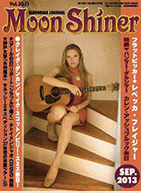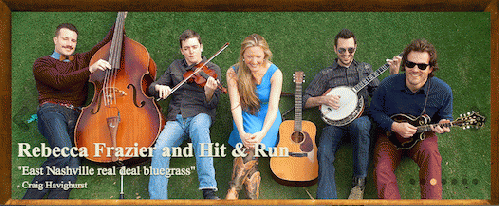All that practice definitely paid off, Rebecca! Among your other talents, you're a masterful guitarist. I understand that picking bluegrass is different from playing other kinds of music. [I'm not sure of the terminology, but I think you'll get my gist.] Can you explain to us non-guitarists how the styles are different? Also, if you're good at one, do you have to unlearn that style in order to play the other one well?
You are right that bluegrass guitar has its own language. Just as you'd learn the bebop language if you wanted to play in the vein of Charlie Parker-era jazz, you will learn the bluegrass language if you want to play bluegrass guitar. Similar to jazz, there are different styles within the genre. I tend to play more in the Tony Rice & Clarence White spectrum. No, you don't need to unlearn other styles in order to play bluegrass. But it sure helps to immerse yourself in the bluegrass style, if you'd like to be proficient in this genre. For bluegrass guitar, we usually play on dreadnought guitars. Nice, big, loud guitars with plenty of low end for hard driving rhythm. We play with beefy flatpicks that give plenty of tone (enough volume to be heard above the fiddles and banjos--if that's even possible!). We usually play in the "down-up" technique, playing downstrokes on the downbeat and upstrokes on the upbeat. And we usually play melodies and variations that derive from the bluegrass standard repertoire, which includes the Bill Monroe and Flatt & Scruggs classics as well as fiddle tunes of Appalachian (thus Scots Irish) origin. When improvising, we use a style of variation and embellishment that has been developed over the past 70 years in the bluegrass genre. That's not to say there isn't room for innovation--there is! But there's a fine line, if you are wanting to have the "bluegrass sound."
Thanks. That was helpful. Well, I believe you must have been a good student because you have soared as a guitarist, songwriter and singer. You first emerged on the national scene with festival-winning, Colorado-based Hit & Run Bluegrass. Tell us about that, please.
Ha! Thanks for the compliment. I really appreciate it! Yes, Hit & Run began in late 2001. I'd been traveling all over Colorado, attending festivals and meeting other players. I'd met a banjo player, Aaron Youngberg, at a festival in Grand Junction in summer 2001; he called me a few months later and said, "I think we should start a band." We were both really dedicated to bluegrass and very interested in digging into a project. We gathered some players at his house in Fort Collins--two of us drove 1.5 hours north from Boulder, and two others drove 1.5 hours south from Laramie, WY, where they were attending university. We enjoyed that first rehearsal so much that we stuck with a weekly rehearsal for about six months before we played our first show in late March, 2002. We were a bit shaky, honestly, but we were so excited to be playing our new material that we had a great time. And in July, 2002, we won the Rockygrass Band Competition--a HUGE surprise, honestly, because we were a brand new, local band. The other finalists were nationally touring bands.
We were shocked. Then we tried it again at the Telluride Bluegrass Festival in 2003; we won again. These wins really bolstered our confidence and gave us an affirmation to keep moving in a professional direction. It had never really occurred to me that this could become a full-time band. I was already playing full-time in a country band called the All Night Honky Tonk All-Stars, and the others were attending college full-time. But in 2003, things moved pretty quickly and we were putting together an album at Doobie Shea Studios in Virginia and starting to get requests to play festivals nationally. So by 2004, we were touring festivals from coast to coast with our new album 'Beauty Fades' under our belts. And in 2005, we put out another studio album 'Without Maps or Charts,' and we won the International Bluegrass Band Competition at SPBGMA in Nashville.
That year, we were also invited to be an official showcase band at the International Bluegrass Music Association's conference in Louisville, KY. These years were heavy, heavy touring years, where I mostly lived out of a suitcase. I had to learn a lot of different skills and do all sorts of things I never thought I'd have to do. For example, there was the time at the Canadian border where they were giving us a hard time. We had to sleep overnight at the border and act patient until they finally let us through. When we arrived at the festival--rumpled, on three hours of van sleep--they said "Welcome! Here's the stage...your set is in an hour." But all in all, these years were incredible. We camped at the Grand Canyon, hiked in the Sierra Nevadas, saw Mount Rushmore, enjoyed Oregon beaches, played in Manhattan, took a ferry to Vancouver Island in British Columbia, passed by Hoover Dam...just to name a few experiences. We met so many wonderful fans, promoters, and other musicians. We got an education on the job. We would teach workshops at festivals, alongside more experienced musicians. We would then hang out and jam with them, and they were often generous with their knowledge. It was a great way to spend my twenties, and I don't regret a minute of it.
What an exciting and busy time it was! It would be quite challenging to do indefinitely, though. How is life different now? How do you juggle the various demands?
(Note: You can view every article as one long page if you sign up as an Advocate Member, or higher).








